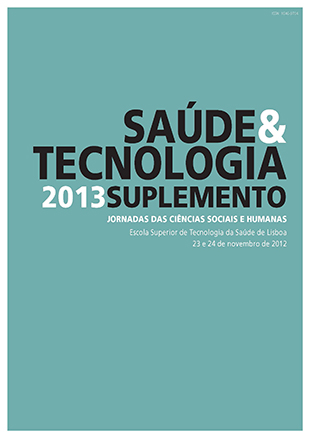Intervention with self-suggestive procedures for self-efficacy and pain control
DOI:
https://doi.org/10.25758/set.854Keywords:
Effectiveness, Self-suggestive intervention, Pain, Perceived control, Self-efficacyAbstract
Introduction – Pain is the predominant complaint in many medical diseases and carries several implications for the patient1-4. The present study aimed to evaluate the effectiveness of a self-suggestive intervention, as a complement to medical treatment, in the patient's self-efficacy and pain control. Methodology – For this aim, 205 adult patients suffering from pain were randomized into two groups that received different interventions during 12 weeks: the IAS group received a self-suggestive intervention and the ISAS group received an intervention without self-suggestion. The two groups were compared regarding the changes in self-efficacy and pain control over the 12 weeks. Results and discussion – The results showed a statistically significant increase of these variables in the IAS group but not in the ISAS group, suggesting the efficacy of the self-suggestive intervention. This study represents an important contribution to the clinical practice of patients suffering from pain.
Downloads
References
Kelemen L, Lee AL, Button BM, Presnell S, Wilson JW, Holland AE. Pain impacts on quality of life and interferes with treatment in adults with cystic fibrosis. Physiother Res Int. 2012;17(3):132-41.
De Sousa L, Frank AO. Patients’ experiences of the impact of chronic back pain on family life and work. Disabil Rehabil. 2011;33(4):310-8.
El Miedany Y, El Gaafary M, El Aroussy N, Youssef S, Ahmed I. Sexual dysfunction in rheumatoid arthritis patients: arthritis and beyond. Clin Rheumatol. 2012;31(4):601-6.
Sharma N, Hansen CH, O’Connor M, Thekkumpurath P, Walker J, Kleiboer A, et al. Sleep problems in cancer patients: prevalence and association with distress and pain. Psychooncology. 2012;21(9):1003-9.
Queiroz MV. Aspectos psico-sociais das doenças reumáticas. In Queiroz MV, editor. Reumatologia clínica. Lisboa: Lidel; 1996. p. 441-5. ISBN 9729018987
Burger JM. Negative reactions to increases in perceived personal control. J Pers Soc Psychol. 1989;56(2):246-56.
Bandura A. Self-efficacy: the exercise of control. New York: Worth Publishers; 1997. ISBN 9780716728504
Tennen H, Affleck G, Urrows S, Higgins P, Mendola R. Perceiving control, construing benefits, and daily processes in rheumatoid arthritis. Can J Behav Sci. 1992;24(2):186-203.
Litt MD. Self-efficacy and perceived control: cognitive mediators of pain tolerance. J Pers Soc Psychol. 1988;54(1):149-60.
Penninx BW, Van Tilburg T, Deeg DJ, Kriegsman DM, Boeke AJ, Van Eijk JT. Direct and buffer effects of social support and personal coping resources in individuals with arthritis. Soc Sci Med. 1997;44(3):393-402.
Lackner JM, Carosella AM, Feuerstein M. Pain expectancies, pain, and functional self-efficacy expectancies as determinants of disability in patients with chronic low back disorders. J Consult Clin Psychology. 1996;64(1):212-20.
Tan G, Alvarez JA, Jensen MP. Complementary and alternative medicine approaches to pain management. J Clin Psychol. 2006;62(11):1419-31.
Baird CL, Murawski MM, Wu J. Efficacy of guided imagery with relaxation for osteoarthritis symptoms and medication intake. Pain Manag Nurs. 2010;11(1):56-65.
Elkins G, Johnson A, Fisher W. Cognitive hypnotherapy for pain management. Am J Clin Hypn. 2012;54(4):294-310.
Joyce-Moniz L. Hipnose, meditação, relaxamento, dramatização: técnicas de sugestão e auto-sugestão. Porto: Porto Editora; 2010. ISBN 9789720347558
Marchand WR. Mindfulness-based stress reduction, mindfulness-based cognitive therapy, and Zen meditation for depression, anxiety, pain and psychological distress. J Psychiatr Pract. 2012;18(4):233-52.
Cruise CE, Broderick J, Porter L, Kaell A, Stone AA. Reactive effects of diary self-assessment in chronic pain patients. Pain. 1996;67(2-3):253-8.
Kwekkeboom KL, Gretarsdottir E. Systematic review of relaxation interventions for pain. J Nurs Scholarsh. 2006;38(3):269-77.
Joyce-Moniz L, Barros L. Psicologia da doença para cuidados de saúde: desenvolvimento e intervenção. Porto: ASA; 2005. ISBN 9789724141220
Bersnstein D, Borkovec T. A progressive relaxation training: a manual for the helping professions. Chanmpaign: Research; 1973. ISBN 0878221042
Schultz JH. Autogenic training: a psychophysiologic approach in psychotherapy. New York: Grune and Stratton; 1959.
Pires A, Joyce-Moniz L. Significações de doença, confronto sintomático e adaptação em pacientes de Reumatologia e Ortopedia: uma abordagem desenvolvimentista e dialéctica. Anál Psicol. 2008;26(2):309-26. Portuguese
Pires AF, Joyce-Moniz L. Procedimentos de auto-sugestão no confronto com duas patologias reumáticas auto-imunes: artrite reumatóide e espondilite anquilosante [Procedures of self-suggestion in the confrontation with two self-immune rheumatic diseases: rheumatoid arthritis and ankylosing spondylitis]. Psychologica. 2010;1(52):301-14. Portuguese
Downloads
Published
Issue
Section
License
Copyright (c) 2022 Saúde e Tecnologia

This work is licensed under a Creative Commons Attribution-NonCommercial-NoDerivatives 4.0 International License.
The journal Saúde & Tecnologia offers immediate free access to its content, following the principle that making scientific knowledge available to the public free of charge provides greater worldwide democratization of knowledge.
The journal Saúde & Tecnologia does not charge authors any submission or article processing charges (APC).
All content is licensed under a Creative Commons CC-BY-NC-ND license. Authors have the right to: reproduce their work in physical or digital form for personal, professional, or teaching use, but not for commercial use (including the sale of the right to access the article); deposit on their website, that of their institution or in a repository an exact copy in electronic format of the article published by Saúde & Tecnologia, provided that reference is made to its publication in Saúde & Tecnologia and its content (including symbols identifying the journal) is not altered; publish in a book of which they are authors or editors the total or partial content of the manuscript, provided that reference is made to its publication in Saúde & Tecnologia.







